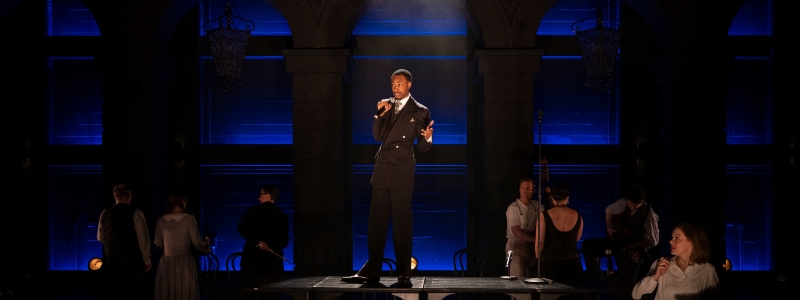Post-Show Discussion Activity

Use these questions to reflect, discuss, or journal about your experience and reactions to Berlin! Explore any of the questions that interest you.
If engaging in this activity independently, consider taking notes or writing your reflections down. If engaging in this activity with a class or group, decide if you would like to answer every question in order, skip around, or select certain questions to spend time on.
Discussion Questions
- What does Theo represent? What does his presence add to the play?
- How do the effects of World War I permeate the lives of the characters in Berlin?
- This play is an adaptation of the graphic novel Berlin by Jason Lutes. How does the play capture the energy or medium of a printed and illustrated text?
- In this play, many actors play roles in addition to their primary one. Rather than this being a typical double-casting where one actor plays more than one character, it is characters who play other characters in Berlin. What is the effect of this decision on the story?
- Rosa Luxemburg was a Polish and naturalised-German revolutionary and Marxist theorist. She was arrested, tortured, and then executed in 1919, and her body was dumped into the Landwehr Canal. Throughout Berlin, “into the river” is an oft-repeated refrain. Why do you think this is?
- There are undoubtedly humorous moments in this play alongside the ascendant fascism. What role does humor have in fighting fascist regimes?
- Why does Hitler want to be drawn so badly? What does it mean that an audience member is instead drawn?
- In history, how does art get the last say?
- This activity aligns with the following standards:
- Illinois Arts Learning Standards
- Anchor Standard 7: Perceive and analyze artistic work.
- Anchor Standard 8: Construct meaningful interpretations of artistic work.
- Anchor Standard 11: Relate artistic ideas and works with societal, cultural, and historical context to deepen understanding.
- Common Core State Standards
- CCSS.ELA.SL.1 Prepare for and participate effectively in a range of conversations and collaborations with diverse partners, building on others’ ideas and expressing their own clearly and persuasively.
- CCSS.ELA.RL.3 Analyze how and why individuals, events, and ideas develop and interact over the course of a text.
- Illinois Arts Learning Standards